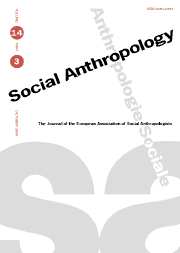Beyond belief? Play, scepticism, and religion in a West African village
Published online by Cambridge University Press: 06 March 2002
Abstract
This paper explores an overlooked dimension of religious transformation in so-called 'traditional' African religious practice - embodied scepticism. Manjaco youths mimic local religious traditions in playful ways. And they are quick to criticise the ritual practices and underlying beliefs of their elders. These sceptical youths have been at the vanguard of revolutionising village-level religious practice - pushing the community at large to modify or outlaw certain religious customs and to do away with certain village spirit shrines. Such youthful scepticism has often been explained in the literature as a symptom of 'modernisation' - as youth become more cosmopolitan, as they are exposed, as it were, to alternate ways of explaining the world, they lose faith in old ways and beliefs. I criticise this model by looking at the sometimes paradoxical ways that embodied ritual practice supports or undermines local religious beliefs.
- Type
- Research Article
- Information
- Copyright
- © 2002 European Association of Social Anthropologists
Footnotes
- 1
- Cited by


